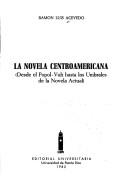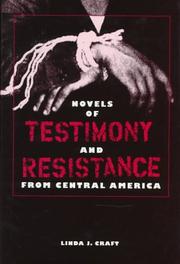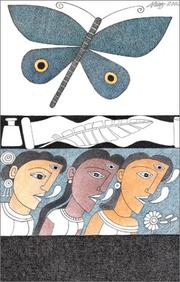| Listing 1 - 9 of 9 |
Sort by
|
Book
ISBN: 9788484896838 8484896838 9783865277312 3865277314 Year: 2012 Volume: 61 Publisher: Madrid : Frankfurt am Main : Iberoamericana ; Vervuert,
Abstract | Keywords | Export | Availability | Bookmark
 Loading...
Loading...Choose an application
- Reference Manager
- EndNote
- RefWorks (Direct export to RefWorks)
Book
ISBN: 1782844384 9781782844389 9781845198602 1845198603 Year: 2018 Publisher: Portland, Oregon
Abstract | Keywords | Export | Availability | Bookmark
 Loading...
Loading...Choose an application
- Reference Manager
- EndNote
- RefWorks (Direct export to RefWorks)
"This book is a series of original, critical meditations on short stories and novels from Central America between 1995 and 2016. During the Cold War, literary art in Central America, as in Latin America in general, was strongly over-determined by the politics of the Cold War, which gave rise to popular struggle and three major armed civil wars in the 1970s and 1980s in Nicaragua, El Salvador and Guatemala. The period produced intense literary activity with political ideology central, personified by social denunciation in the testimonial novel and revolutionary poetry. Since then, though themes of violence are still at much of its core, Central American fiction has become more complex. We have witnessed a resurgence of literary writing and criticism with a focus squarely on the artistic side of narrative art: writing aware of its own figurative manoeuvres and inventiveness, its philosophical and affective dimensions, and its carefully crafted syntax. This collection of essays by Jeffrey Browitt attempts to trace some of the contours of this new literature and the contemporary subjectivities of its writers through close readings of Guatemala's Rodrigo Rey Rosa, Eduardo Halfon and Denise Phé-Funchal; Nicaragua's Franz Galich and Sergio Ramírez; Belize's David Ruiz Puga; El Salvador's Jacinta Escudos and Claudia Hernández; and Costa Rica's Carlos Cortés. Key themes are gender, subjectivity and affect as these intersect with the deconstruction of the family, hegemonic masculinity, motherhood, revolutionary romanticism, and the relationship of humans with animals" --
Central American fiction --- Families in literature. --- Family in literature --- Central American literature --- History and criticism.
Book
ISBN: 178284614X 1782846166 Year: 2020 Publisher: Brighton, [England] ; Chicago, Illinois ; Toronto, Canada : Sussex Academic Press,
Abstract | Keywords | Export | Availability | Bookmark
 Loading...
Loading...Choose an application
- Reference Manager
- EndNote
- RefWorks (Direct export to RefWorks)
Cicatrices provides an understanding of the mood in Central American fiction over the last five years. Many recent novels and short stories are aesthetic responses to a difficult social, political and economic landscape dominated by neoliberal adjustment, drug trafficking, corruption and the struggle to establish fully democratic societies. Herein is a mix of male and female authors spread across five Central American countries: Guatemala, Nicaragua, El Salvador, Costa Rica and Honduras. Thematic unity is provided by nomadism, migration and the inability to leave behind a violent past of armed conflict that bleeds into the present-scars that won't heal. An atmosphere of survival, exhaustion, dissipation and decay (in both the physical and moral sense) dominates, but also rays of hope: the writers testify to the triumph of the spirit as much as to its destruction. This vibrant literature speaks of existential crisis in a context of social precarity and lack of opportunity as people dis-embedded by civil war and its aftermath seek release and fulfillment through migration across borders into neighbouring countries or north to the United States or Europe. Whether external or internal, self-imposed or forced, migration brings in train the problem of mal-adaptation to new worlds and struggles with memory - an aesthetics of loss and solitude. Various narrative strategies are adopted to try to account for this contemporary social reality, including crime fiction as critical realism, as well as auto-fiction.

ISBN: 0847705846 0847705854 Year: 1982 Publisher: Puerto Rico Universidad de Puerto Rico
Abstract | Keywords | Export | Availability | Bookmark
 Loading...
Loading...Choose an application
- Reference Manager
- EndNote
- RefWorks (Direct export to RefWorks)
Book
ISBN: 9789004540255 9789004533813 Year: 2023 Publisher: Leiden Brill
Abstract | Keywords | Export | Availability | Bookmark
 Loading...
Loading...Choose an application
- Reference Manager
- EndNote
- RefWorks (Direct export to RefWorks)
"In this book, Marileen La Haije offers a thorough and innovative analysis of the intersections between madness and trauma in recent Central American literature on (post)war. A central argument of her study is that these literary texts challenge the taboo of madness in Latin American contexts of memory, by showing that talking about madness does not necessarily lead to stigmatizing victims of political violence or disqualifying their stories about traumatic experiences. La Haije highlights the importance of including madness on the research agenda in the field of memory studies in Latin America"--

ISBN: 0813015081 Year: 1997 Publisher: Gainesville, Fla University Press of Florida
Abstract | Keywords | Export | Availability | Bookmark
 Loading...
Loading...Choose an application
- Reference Manager
- EndNote
- RefWorks (Direct export to RefWorks)
Fiction --- Spanish-American literature --- anno 1900-1999 --- Central American fiction --- 20th century --- History and criticism --- Historical fiction [Central American ] --- Reportage literature [Central American ] --- Central American fiction - 20th century - History and criticism. --- Historical fiction, Central American - History and criticism. --- Reportage literature, Central American - History and criticism.

ISBN: 0896802337 0896804461 Year: 2003 Publisher: Center for International Studies, Ohio University
Abstract | Keywords | Export | Availability | Bookmark
 Loading...
Loading...Choose an application
- Reference Manager
- EndNote
- RefWorks (Direct export to RefWorks)
Central American fiction --- Central American fiction --- Literature and history --- Women and literature --- Women in literature. --- Women authors --- History and criticism. --- History and criticism. --- Alegría, Claribel --- Aguilar, Rosario, --- Belli, Gioconda, --- Lobo, Tatiana --- Criticism and interpretation. --- Criticism and interpretation. --- Criticism and interpretation. --- Criticism and interpretation.
Book
ISBN: 9789929552043 9929552049 Year: 2010 Publisher: Guatemala, Guatemala : F&G Editores,
Abstract | Keywords | Export | Availability | Bookmark
 Loading...
Loading...Choose an application
- Reference Manager
- EndNote
- RefWorks (Direct export to RefWorks)
En contraste con la estética utópica de la esperanza que estuvo ligada a los procesos revolucionarios, Beatriz Cortez ha llamado estética del cinismo a una producción literaria que expresa desencanto. Esta investigación aborda el desencanto y el cinismo que se expresa a través de la literatura centroamericana desde mediados del siglo xx, pero que ha proliferado en la actualidad, después de terminada la época del sandinismo en Nicaragua y tras la firma de los Acuerdos de Paz en El Salvador y Guatemala. Este volumen explora la formación de una subjetividad precaria en medio de una sensibilidad de posguerra colmada de desencanto. Es una subjetividad constituida como subalterna a priori, que depende del reconocimiento de otros, que se posibilita por medio de la esclavitud de ese sujeto que a priori se ha constituido como subalterno, de su destrucción, de su desmembramiento, de su suicidio. La estética del cinismo se explora como una expresión de la experiencia centroamericana de la actualidad, pero también como la expresión de un proyecto identitario fallido, como una trampa que constituye la subjetividad por medio de la destrucción del ser a quien constituye como sujeto.
Violence in literature. --- Central American fiction --- Emotions in literature. --- Masculinity in literature. --- Cynicism in literature. --- History and criticism. --- War and literature --- National characteristics, Central American, in literature. --- Violence --- Roman centraméricain --- Emotions --- Masculinité (psychologie) --- Cynisme --- dans la littérature --- 20e siècle --- Histoire et critique --- Roman centraméricain --- Masculinité (psychologie) --- dans la littérature --- 20e siècle

ISBN: 0813022347 9780813022345 0813015081 Year: 1997 Publisher: Gainesville : University Press of Florida,
Abstract | Keywords | Export | Availability | Bookmark
 Loading...
Loading...Choose an application
- Reference Manager
- EndNote
- RefWorks (Direct export to RefWorks)
"In seven chapters, Craft argues for a new, generic recognition for what used to be known as 'political novels.' Discussion is generally convincing, well-researched, and occasionally revealing. The first two chapters and their conclusions are similar to accepted scholarly arguments. Craft is at her best when analyzing works by Claribel Alegría, Manlio Argueta, and Belli, in that order. More attention could have been given to Sergio Ramírez's development, which does not fit into the author's thesis, and to Rigoberto Menchú. A noteworthy error: Monterroso never wrote a book titled 'Mr. Taylor & Co.' (the actual title story is from the 1950s). The title refers to a Cuban selection of his stories"--Handbook of Latin American Studies, v. 58.
Central American fiction --- Historical fiction, Central American --- Reportage literature, Central American --- Romance Literatures --- Languages & Literatures --- Spanish Literature --- Central American reportage literature --- Central American prose literature --- Central American historical fiction --- Central American literature --- History and criticism. --- History and criticism --- Alegría, Claribel --- Argueta, Manlio, --- Arías, Arturo, --- Belli, Gioconda, --- Flakoll, Claribel Alegría --- Alegría, Clarivel --- Alegría, C. --- Alegría Vides, Clara Isabel --- Criticism and interpretation.
| Listing 1 - 9 of 9 |
Sort by
|

 Search
Search Feedback
Feedback About UniCat
About UniCat  Help
Help News
News